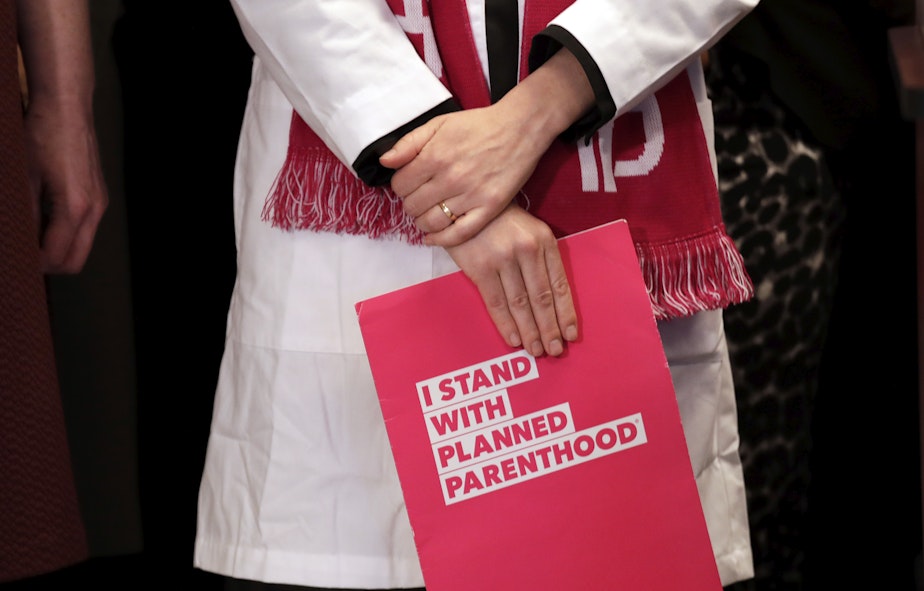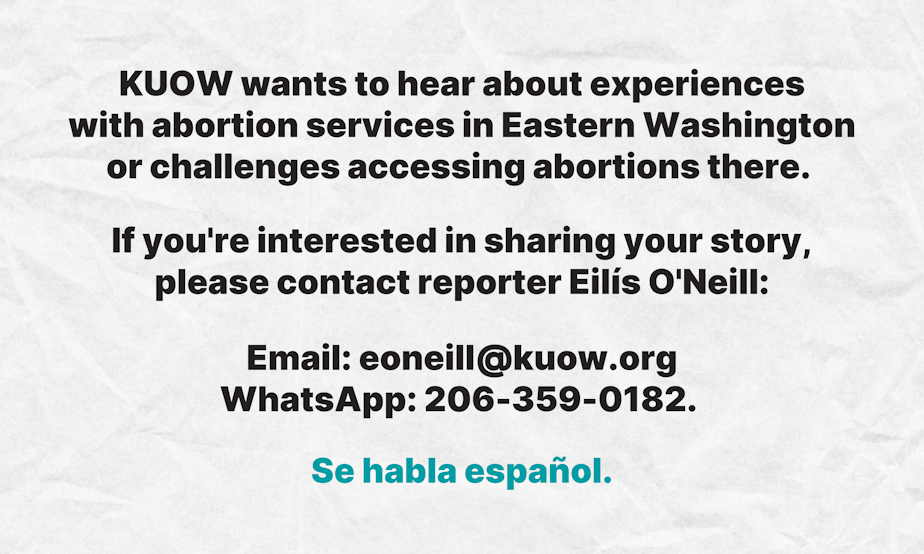Longer wait times, discouraged patients: What abortion rights advocates in Washington expect post-Roe

Providers in Washington are trying to meet the increased demand for abortions here with medication abortions, longer hours, and at least one additional clinic — but they can’t ramp up fast enough to meet an expected surge in demand.
Between people flying into the Seattle area from far-away states where abortion is now illegal or very limited, and people driving from Idaho and possibly Montana to Eastern Washington, the demand for abortion is expected to quintuple in Washington state in the coming months. That will make it harder for residents to get abortion appointments, especially in the eastern half of the state, where clinics that provide abortions are few and far between.
“I can totally anticipate people not being able to get an appointment and having to wait longer, having to go into their second trimester for abortion care, being discouraged and having to carry a pregnancy and have a child that they didn't plan to have or want to have,” said Iris Alatorre, program manager for the Northwest Abortion Access Fund, an organization that helps people in Washington, Oregon, Idaho and Alaska who are struggling to pay for or get to their abortion appointments.
One especially limited service in Eastern Washington is surgical or procedural abortion, which is performed by a health care provider in a clinical setting (as opposed to pills that people can take at home). Only three clinics in Washington offer that service east of the Cascades — Planned Parenthood locations in Spokane, Yakima, and the Tri-Cities. One more clinic in Yakima is coming online in July. That means people outside of those three urban areas have to drive far, and sometimes wait several weeks, for an appointment.
In Eastern Washington, “clinics are booked out completely,” Alatorre said. “They're fully booked every week.”
“The infrastructure is already stretched so thin,” agreed Paul Dillon, a Planned Parenthood spokesperson.
Sponsored
For comparison, in the Seattle-Tacoma area alone, there are at least ten places (nine clinics, and the UW Hospital) that offer surgical abortions.
Abortion is still legal in Washington state after last week’s Supreme Court ruling overturning Roe v. Wade. But the ruling is nonetheless having an impact in Washington, which is only expected to increase in late August, when an Idaho law making abortion illegal there with very few exceptions is expected to take effect.
Even before the ruling, demand for abortions had already increased throughout Washington state. People from Texas were flying into Seattle, and Idaho residents nervous about the legal status of abortion in their state — or sometimes misinformed — were driving across the border. The number of patients from Idaho at the Planned Parenthood in Pullman, Washington, for example, jumped from about 45% of the clinic’s patients in early 2022 to about 65% in June, after the leaked Supreme Court opinion.
Advocates for abortion rights say one potential solution to meet the growing demand would be increasing medication abortions.
Sponsored

About half of all abortions are medical, not surgical — meaning that the pregnant person takes a combination of pills (mifepristone and misoprostol) that end the pregnancy and stimulate contractions to empty the uterus. Medication abortions require less time for providers, and less time in clinics, because patients just need to pick up their prescription (or, sometimes, receive it in the mail) and then take the pills at home. After that, providers only need to be on call in case of complications, which are extremely rare.
“Medication abortion will be a big lifesaver in this arena,” said Alatorre, with the Northwest Abortion Access Fund, “because first-trimester folks can easily access medication abortion providers in Washington more easily and quicker than having to get an appointment.”
It’s not currently legal for providers to prescribe these medications across state lines — so, to obtain the pills legally, Idaho residents will still need to travel to Washington state.
The FDA has approved medication abortions through the first ten weeks (70 days) after the patient’s last menstrual period, which covers about three quarters of all abortions. And some providers prescribe the pills off-label past that date.
Sponsored
Demand for in-person, surgical abortions will continue even as the number of medication abortions increases. Some people prefer surgical abortions even early in pregnancy, because the process is quicker and generally involves less bleeding. For anyone beyond the first trimester, a surgical abortion is the only option to terminate their pregnancy.
Washington state providers are working to increase capacity by expanding hours, opening Saturday clinics and hiring new staff. The Planned Parenthood locations in Spokane and Spokane Valley, for example, have had clinics every other Saturday for about a year and are considering making those weekly.
In July, one Seattle-area clinic that provides abortions, Cedar River Clinics, will start offering appointments at a location in Yakima that had been closed for years. Their goal is to reduce wait times for appointments east of the Cascades.
“Due to growing wait times at local clinics, patients from Eastern Washington have been travelling to our clinics in Western Washington,” executive director Connie Cantrell wrote in a press release. “We heard from our community members in Eastern Washington that they hoped we would reopen.”
Having to wait a few weeks for an abortion not only means being pregnant for a few extra weeks; it also can mean crossing the threshold between the first and second trimesters, which makes patients ineligible for a medication abortion and doubles the cost of a surgical abortion, from about $750 to about $1500.
Sponsored
Most advocates do not expect that the steps Washington state clinics are taking to increase access to abortion will meet the increased demand — at least not right away.
“It will take time,” said Kia Guarino, the executive director of Pro-Choice Washington. “I think we can do it, and I think a lot of the clinics are working really hard to do it, but … it [will] take some time.”
In the meantime, people seeking to terminate their pregnancies will face new calculations: trying to decide whether to opt for a medication abortion, drive further, wait longer, or give up altogether.
“I can't even begin to imagine how our abortion providers are going to have the capacity,” Alatorre said. “It's hard to grapple with the reality of how things are going to change.”




